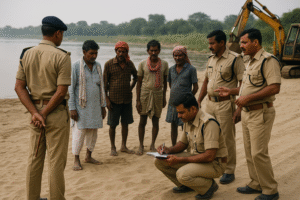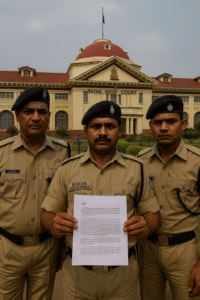Simplified Explanation of the Judgment
The Patna High Court, in a decision dated 18 May 2021, dismissed two criminal miscellaneous petitions (Cr. Misc. Nos. 24550 and 24626 of 2020) that sought to quash non-bailable warrants issued by the Judicial Magistrate, Katihar, in connection with a sensational triple-death case. The petitions arose from Katihar Muffasil P.S. Case No. 57 of 2020, which was registered under Sections 306 (abetment of suicide) and 120B/34 (criminal conspiracy and common intention) of the Indian Penal Code.
The case stemmed from the tragic discovery of three bodies — a man, his wife, and their four-year-old son — found dead in their rented house. A purported suicide note was also recovered, in which the deceased explained the reasons leading to the family’s demise. Initially, the case was lodged against unknown persons.
The petitioners, two local men from Katihar, later found their names mentioned in the suicide note and were accused of harassment and moneylending at high interest rates that allegedly drove the deceased to take his life. The Magistrate issued non-bailable warrants (NBWs) against them just six days after the FIR was filed.
The petitioners argued before the High Court that:
- Their names did not appear in the FIR and were only vaguely mentioned in the so-called suicide note.
- No direct or circumstantial evidence linked them to any abetment or criminal conspiracy.
- The Magistrate issued the NBW without examining materials or recording reasons.
- They had merely lent money to the deceased, which is not an offence.
- They cited the Supreme Court’s ruling in Arnab Manoranjan Goswami v. State of Maharashtra (2020), where the Court emphasized that to attract Section 306 IPC, there must be clear evidence of active instigation or aiding in suicide.
The informant’s side, however, painted a different picture. It was alleged that:
- The petitioners used to lend money at exorbitant interest rates.
- When the deceased failed to repay even after selling land, they publicly humiliated and tortured him.
- They allegedly forced him to sign blank papers and cheques, which pushed him into desperation.
- The inquest report revealed that the deceased’s and his wife’s hands were tied behind their backs, suggesting murder rather than suicide.
- The police also obtained call detail records (CDR) showing contact between the deceased and the petitioners on the date of occurrence.
- The informant further submitted that proclamation under Section 82 CrPC (for absconding accused) had already been issued, rendering these petitions infructuous.
The Court’s Findings
Justice Prabhat Kumar Singh examined the record and held that the Magistrate’s order issuing non-bailable warrants was proper and within jurisdiction. The Court noted that:
- The Magistrate had considered the facts, circumstances, and case materials before issuing the warrants.
- The law does not require the Magistrate to restate every reason given in the police application; it is enough that relevant materials exist and were considered.
- The precedents cited by the petitioners were found inapplicable, as none of them dealt with the issuance of non-bailable warrants.
- The Arnab Goswami case dealt with the High Court’s power to grant bail and quash FIRs, not with the procedural propriety of warrants.
- The other judgments cited related to proclamation proceedings (Sections 82 and 83 CrPC), not warrants of arrest.
Accordingly, the High Court held that there was no illegality or procedural error in the Magistrate’s order and dismissed both petitions as devoid of merit.
Significance or Implication of the Judgment
This judgment reinforces the principle that non-bailable warrants can be issued at an early stage of investigation if the Magistrate finds prima facie material suggesting the accused’s involvement and the necessity of securing their presence.
For accused persons, it serves as a reminder that merely being unnamed in the FIR does not guarantee immunity if later evidence (like a suicide note or witness statements) links them to the offence.
For the judicial system, the decision affirms that Magistrates need not write lengthy reasons while issuing NBWs — it is sufficient if they have considered the case diary and the material provided by police.
From a public policy perspective, the case underscores judicial caution in moneylending-related suicides — a recurring issue in Bihar’s rural and semi-urban areas. The judgment shows that when alleged financial exploitation results in extreme distress leading to death, courts may permit criminal prosecution even at an early stage.
Legal Issue(s) Decided and the Court’s Decision
- Whether the Magistrate erred in issuing non-bailable warrants against the petitioners.
Decision: No. The Magistrate acted within his powers and after considering relevant materials. - Whether reference to the petitioners’ names in a suicide note, without more, could justify criminal proceedings under Section 306 IPC.
Decision: The High Court did not go into this factual determination, holding that such issues must be tried during trial, not at the pre-trial stage. - Whether precedents like Arnab Goswami’s case applied.
Decision: No. That case dealt with bail and quashing under Articles 226 and 482 CrPC, not with issuance of warrants. - Final Outcome:
Both petitions dismissed as lacking merit.
Judgments Referred by Parties
- Arnab Manoranjan Goswami v. State of Maharashtra, Cr. Appeal No. 742 of 2020, Supreme Court of India.
- Md. Rustam Alam @ Rustam & Ors v. State of Jharkhand, Cr. M.P. No. 2722 of 2019, Jharkhand High Court.
- Cr. Misc. No. 629 of 2018, Patna High Court.
Judgments Relied Upon or Cited by Court
- None specifically cited in the Court’s reasoning; prior cases were distinguished as factually different.
Case Title
Petitioners v. State of Bihar
Case Number
Criminal Miscellaneous Nos. 24550 of 2020 and 24626 of 2020
(Arising out of Katihar Muffasil P.S. Case No. 57 of 2020)
Citation(s)
2021(2) PLJR 714
Coram and Names of Judges
Hon’ble Mr. Justice Prabhat Kumar Singh
Date of Judgment: 18 May 2021
Names of Advocates and who they appeared for
- For the petitioners: Mr. Raghvendra Kumar Singh, Advocate
- For the informant: Mr. Arun Kumar Mandal, Advocate
- For the State: Learned A.P.P.
Link to Judgment
NiMyNDU1MCMyMDIwIzEjTg==-17xOouQMOvw=
If you found this explanation helpful and wish to stay informed about how legal developments may affect your rights in Bihar, you may consider following Samvida Law Associates for more updates.








